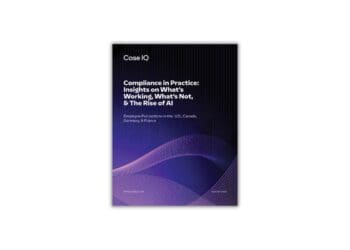Few people involved in corporate scandals actively set out to do harm. So then why are corporate scandals so common? Ethics advocate Anna Romberg explores the human psychology explanations at the heart of why good people sometimes make bad choices.
When a corporate scandal arises, it’s often tempting to think of the action as the deed of one or a few bad employees. It’s human to believe that good people make good decisions and bad people make bad decisions. When discussing corruption and unethical behavior in general, it’s essential to understand how strongly the corporate environment influences a person’s actions. In a certain context, even a good person can make bad decisions.
Corporate scandals often stem from systemic issues rather than individual wrongdoing and it is critical for board professionals to be aware of the risks of ethical blindness, the bystander effect and confirmation bias.
Risks of ethical blindness
When discussing ethical and responsible business, the conversation almost always turns to the significance of culture. A healthy corporate culture is the foundation of sustainable business. In a healthy corporate culture, employees make good and sustainable decisions. However, when something unethical occurs, less emphasis is placed on culture and more on who is the main culprit. When the scapegoat is found within the management, there’s a sigh of relief, and the belief that the corporate culture is otherwise healthy prevails. The focus shifts to a few individuals’ behavior, emphasizing the company’s practices and good culture, without thoroughly examining the true state of the corporate culture.
Many (un)ethical decision-making models assume that people make rational decisions and can theoretically evaluate their decisions from a moral perspective. However, people can be ethically blind and behave unethically without realizing it, especially if they don’t feel they bear ultimate responsibility. A supervisor, for example, might tell a salesperson not to worry about how sales agents handle their tasks because all contracts are the supervisor’s responsibility. As a result, the salesperson doesn’t question the agent’s lavish entertainment of potential clients and officials during overseas trips. If the board authorizes aggressive market expansion, it’s easier for a business manager to use less transparent methods to achieve this goal. Although the board may have instructed everyone to act in accordance with the company’s values, the application of this guidance likely becomes blurred the further away from the home country one goes and the less discussion there is on how to apply the company’s values when facing ethical dilemmas and conflicting objectives.
Professor Guido Palazzo has long studied corporate scandals and why good people make bad decisions. In the midst of a scandal, Palazzo advises every decision-maker to ask themselves: Could I have made this decision, and in what way have I enabled this decision? In his article on ethical blindness, Palazzo and co-authors highlight the significance of context and argue that each of us could be the person who engages in unethical or even illegal activities. How often do we look in the mirror and consider our role in enabling a poor corporate culture? What if the uncovered issue isn’t an exception but rather a concrete manifestation of the corporate culture? How often do boards openly discuss the possibility of broader problems in the corporate culture?
Well-Being Is About Ethics, Too
Expecting compliance with regulations is unreasonable for a worker in a mental health crisis
Read moreDetailsThe bystander effect
Sales manager Richard Bistrong thought he was at the peak of his career when he got a call that he was subject to an internal investigation by his employer, and then shortly thereafter, got another call, this one from the DOJ telling him that he was the target of a criminal investigation. Consequently, he spent only 14 months in prison instead of a possible 11 years. Richard now openly shares the lessons he learned from firsthand experience and often speaks about the significance of conflicting messages. Richard had undergone appropriate training and was well aware of the Foreign Corrupt Practices Act. He takes full responsibility for his actions, but he also mentions that increasingly ambitious goals were set for him without understanding the challenges. His earnings were also heavily tied to sales, and admitting to challenges would have had personal financial consequences. It was easier to maintain success using shady methods. This had worked for years, so why wouldn’t it work in the future? The entire organization benefited from sales success, and most bystanders didn’t intervene or question his achievements.
American social psychologists John Darley and Bibb Latané proposed the theory of the bystander effect. Temporary indifference enables bystander behavior. In large organizations and teams, responsibility is dispersed and it’s assumed that someone else is responsible for intervening. No one wants to be a difficult colleague or a board member who questions something others don’t. What if someone had questioned invoices with vague explanations or challenged a longstanding close relationship with a distributor? What if the management or board had asked how such remarkable sales figures were achieved year after year? However, it’s easier to question bad than good achievements, especially when good achievements benefit the entire organization.
Confirmation bias
Danske Bank’s scandal is another example of how obvious questions about remarkable achievements are not asked. Although the Estonian unit’s share of Danske Bank’s banking assets was only 0.5% before the money-laundering scandal, its share of the group’s total earnings was about 11%. The targeted return on capital for the branch’s foreign client portfolio reached a staggering 402%. Did anyone think to ask how Estonia’s population of 1.3 million had so much wealth? Did anyone think to ask what kind of clients enabled this growth? As the scandal unfolded, it became evident that while these questions were raised at a lower level within the organization, they were not adequately investigated until it was too late. Although some individuals did not act in accordance with the company’s regulations, a culture of non-intervention allowed this to continue for years.
Confirmation bias is a theory proposed by psychologist Peter Wason, suggesting that the mind tends to seek information that confirms existing views and avoid information that could challenge our worldview. It leads us to interpret evidence in ways that support existing beliefs, expectations or hypotheses. If we think the culture is healthy, identifying ethical dilemmas and risks becomes difficult. An individual might wonder: If I haven’t asked this question in the past five years, why would I start questioning it now? It’s more human to validate previous decisions than to challenge them. Unethical behavior becomes normalized when questions are not asked and difficult conversations are not had.
What can be done?
Is anything achievable if all of us can be ethically blind and fall into both the bystander role and confirmation bias? The first step is acknowledging and identifying these phenomena in decision-making situations. Personal beliefs need to be challenged, and diverse perspectives encouraged. Studies show that diverse groups make better decisions, and according to the Nordic Business Ethics (NBE) study, younger generations are more likely to address ethical issues compared to those who have been in the workforce for a long time. The NBE study also indicates that women are more likely to recognize ethical issues than men.
However, identifying situations does not necessarily mean intervening in them. The NBE study also shows that women bring up ethical issues less frequently, which may indicate a fear of consequences. Diversity itself does not guarantee better decisions. It’s also crucial to actively foster a culture of discussion where difficult, obvious and previously avoided questions are raised. It must be acknowledged that it’s not natural to discuss ethical dilemmas and that in business, there are often gray areas where there’s no clear right or wrong answer. Rarely does someone go to work thinking, “Today, I’m going to cause a scandal with consequences in the hundreds of millions of euros.” Ethical muscles need to be exercised. Alarm bells should ring if ethical and responsible business practices are thought to be common sense. The current business context is challenging, but admitting this and seeking new perspectives is the first step toward more sustainable business.




 Anna Romberg Ph.D. is an advocate for ethical business practices, having supported numerous global companies in matters of good governance and compliance as both a leader and through her own company. Currently, Anna serves as a member of the executive management team at the international medical technology company Getinge AB (EVP sustainability, legal & compliance) and as the chairman of the board at NorthHouse AB. She is also one of the founders of the Nordic Business Ethics project and the author of the book "The Grey Zone – a practical guide to corporate conduct, compliance and business ethics."
Anna Romberg Ph.D. is an advocate for ethical business practices, having supported numerous global companies in matters of good governance and compliance as both a leader and through her own company. Currently, Anna serves as a member of the executive management team at the international medical technology company Getinge AB (EVP sustainability, legal & compliance) and as the chairman of the board at NorthHouse AB. She is also one of the founders of the Nordic Business Ethics project and the author of the book "The Grey Zone – a practical guide to corporate conduct, compliance and business ethics." 








